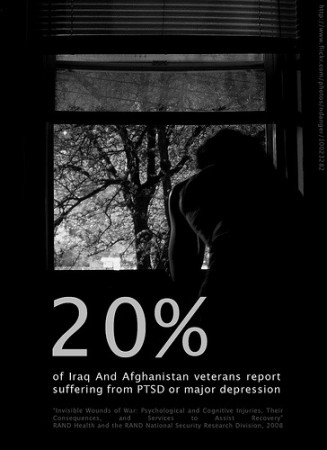Some Rights Reserved by Will Lion at Flickr
I’ve published a new post at Health Central, the second in a series on depression and related problems among veterans. This one looks at PTSD from the perspective of soldiers who’ve been through combat and also at innovative approaches to treatment. I hope you’ll have a look at it. I want to add here some links to sources providing insight about combat trauma to the those of us without military experience, though it’s impossible to really understand without having been through it.
The Mind of a Retired Shooter is a powerful record of the ongoing struggle for recovery of a twenty-year Army veteran. It’s a painfully honest account of the way behavior brought on by PTSD turned away all his friends and family and left him alone to find his way back to a productive life.
Healing Combat Trauma is a veterans’ site with numerous stories in its “Eyewitness to Combat” series. This post vividly portrays the turnaround experience of one veteran who spent years consumed by guilt at being the sole survivor a fire fight. The site also has an exhaustive listing of veterans’ memoirs and poetry as well as dozens of books on innovative treatments.
In Odysseus in America: Combat Trauma and the Trials of Homecoming, psychiatrist Jonathan Shay brings out the need for treatments of PTSD that go beyond the behavioral symptoms to deal with the impact of combat on a person’s fundamental character and sense of moral ordering of the world.
The psychologist Edward Tick looked into non-western spiritual traditions to find a new understanding of the classic warrior experience, one that talks in terms of damaged souls and a ceremonial path to healing. In War and the Soul, he describes a four-step process of healing that has proved to have great meaning and effectiveness for veterans with PTSD.
It consists, first, of a cleansing experience in order to come to terms with the trauma. Many have felt this during ceremonies honoring their dead comrades or in visits to the battlefields where the shock and loss took place. Telling the story of the past is a critical second step, partly to gain distance from traumatic experience but also to start reconnecting with the people who listen.
Third, mutual recognition and restitution with family and community need to occur. As Tick sees it, the individual shouldn’t have to bear the burden of PTSD alone, since the nation as a whole is responsible for sending soldiers to war and supporting those who need help on their return. The last step is the transition by the former soldier to a new role and sense of purpose in life, a change that occurs most effectively with the support of family and community as well as through the hard work of the individual.
Much of the prevailing treatment in the military ignores approaches with such a holistic view of life that help a veteran come to terms with the past. Instead, the emphasis is on putting that experience aside, on using cognitive therapy as a means to change habits of thinking and on focusing on re-integration into the normal routines of life. That simply doesn’t work for many veterans because it fails to address the deepest damage of all.
One of the best portrayals of the impact of combat is Operation Homecoming – Writing the Wartime Experience, a documentary featuring interviews and readings by such writers as Brian Turner (Here, Bullet
), Tim O’Brien (The Things They Carried
), Colby Buzzell (My War: Killing Time in Iraq
) and Paul Fussel (The Great War and Modern Memory
), among many others.
There are dozens of other first-hand accounts of combat trauma and resulting PTSD, but these are great resources to start with.


Anyone interested in learning more about the work of Dr Ed Tick can access three covering war and PTSD. The information covered is helpful not only to combat vets but also to civilians. They are available for free at the iTunes store: http://itunes.apple.com/podcast/why-shamanism-now-a-practical/id306485379. (If that URL isn’t readable, go to http://www.lastmaskcenter.org/media/radio-show.htm and follow the link there.) The episodes are Feb 25, 2009; May 20, 2009; May 27, 2009; and September 9, 2009.
The show’s host, Christina Pratt, also has some interesting perspectives on depression — see her show dated Oct 28, 2009. I especially appreciated her description how shamanistic cultures see what we would call mental illness — see the show dated Oct 21, 2009.
Hope this helps.
Thank you, Joy –
I’ve been looking for interviews with Ed Tick, and these four programs seem really promising. The approach of this program is new to me, but I’m interested to understand how mental illness is dealt with in different cultural traditions.
John